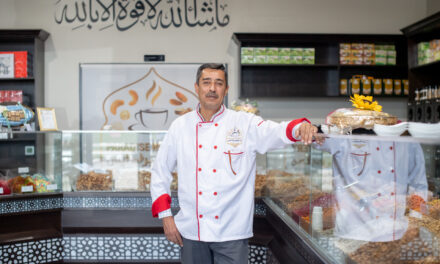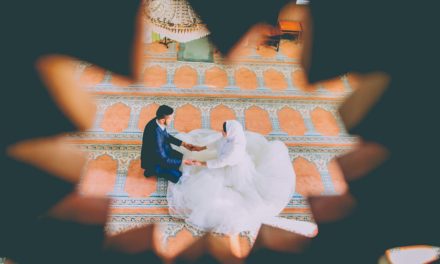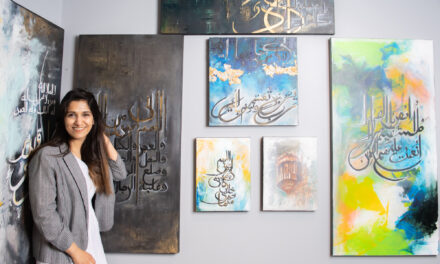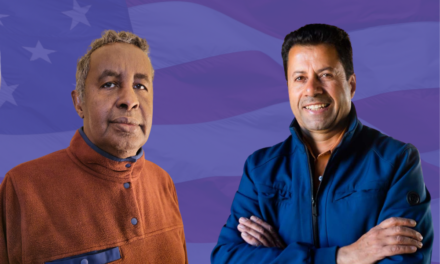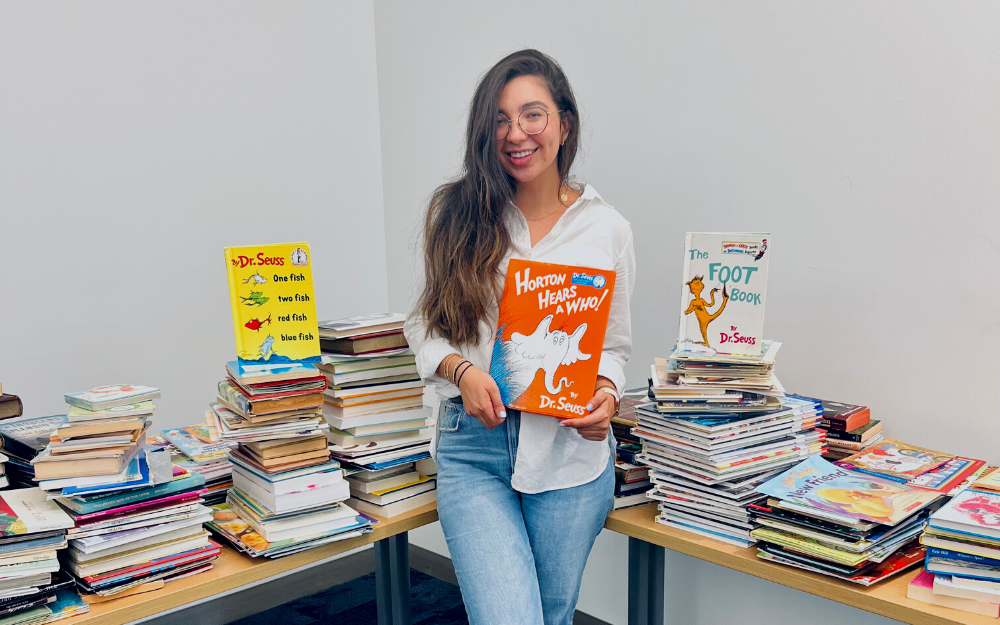
Photo courtesy of Maie Zagloul
Maie Zagloul of Franklin, founder of Books for Chance, poses at the Sept. 2 Books for Chance Book Drive at the Medical College of Wisconsin, where she is a student.
When Maie Zagloul, now a second-year student at the Medical College of Wisconsin, went to Robinwood Elementary in Franklin, she loved the annual Scholastic Book Fair. Every year, she’d stroll between tables stacked with books, glancing at covers, deciding which ones she’d ask her parents to buy for her.
She credits those books and her mother’s encouragement with nurturing her ability to master English after spending a portion of her early childhood exclusively speaking Arabic while they lived in Egypt.
That memory inspires her to create a similar experience for refugees resettled in Milwaukee—with one key difference. Children’s parents will not have to pull out their wallets. At her book fairs, all the books will be free.
Zagloul is the founder of Books for Chance, a nonprofit organization that has distributed thousands of books to displaced children in Lebanon, Syria and now Milwaukee. Recent collaborations with Hanan Refugee Relief Group and the International Institute of Wisconsin, a refugee resettlement agency, as well as “generous contributions” from classmates at MCW and people from Greater Milwaukee, are multiplying her impact, she said.
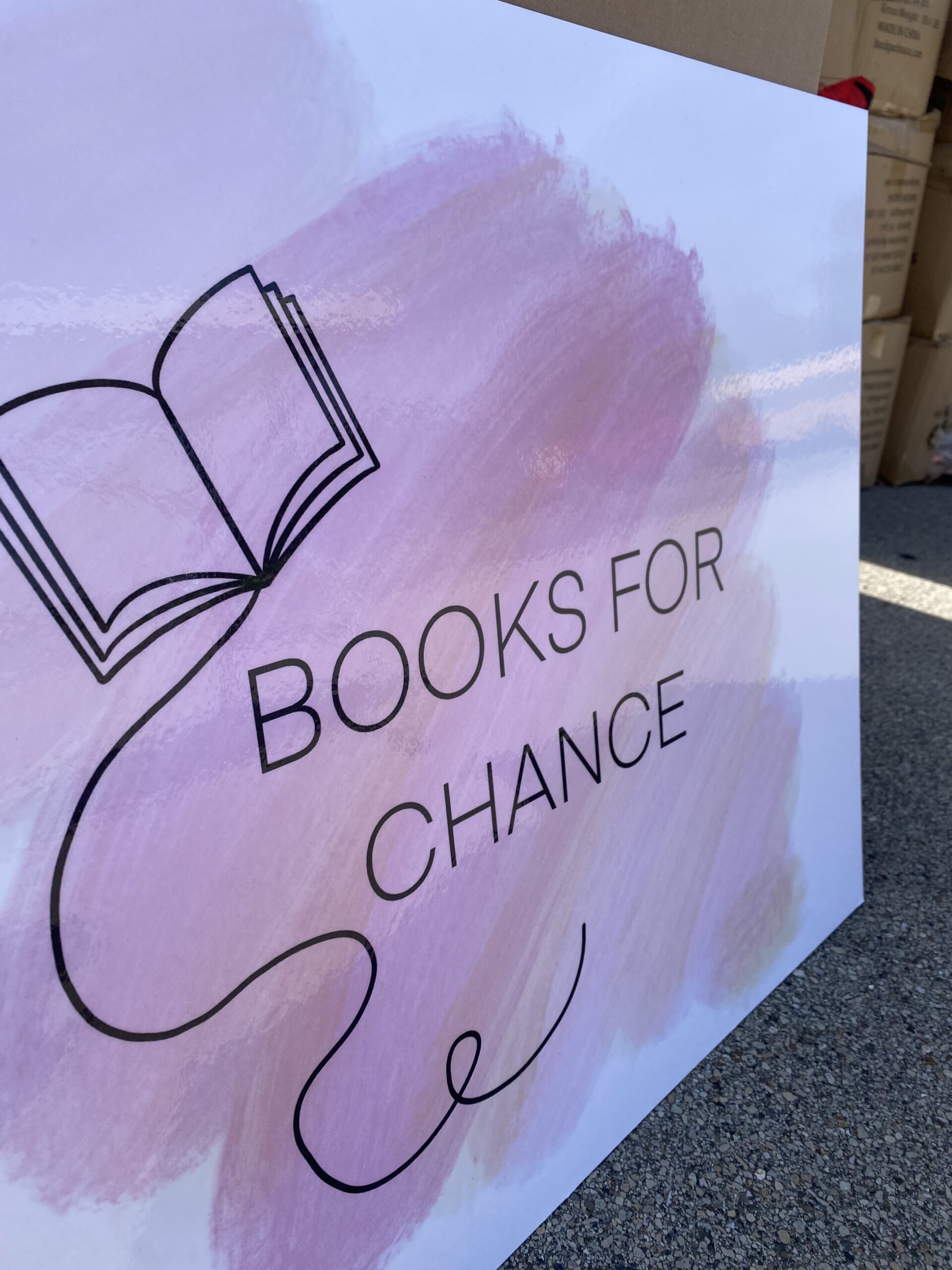
Photo courtesy of Maie Zagloul
The first Books for Chance Book Fair will be held Thursday, Nov. 10, at the Milwaukee Academy of Chinese Language, 2430 W. Wisconsin Ave., a K3-8th grade Milwaukee Public School. The International Institute of Wisconsin reached out on Zagloul’s behalf to schools in the Milwaukee area with the largest populations of refugees and this school was one of them, she said.
In an interview last week with Wisconsin Muslim Journal, the soft-spoken, 25-year-old medical student talked about creating Books for Chance when she was an undergrad at Northwestern University, distributing books to Palestinian and Syrian children in refugee camps, and putting books into the hands of refugee children in Milwaukee.
Getting started
When she was an undergraduate student at Northwestern University, Zagloul thought volunteering in a refugee camp in Lebanon during the summer between her sophomore and junior years would be meaningful. She applied to LEAP, Learning for the Empowerment and Advancement of Palestinians, and was accepted. She planned to spend six weeks teaching English to children in Bourj El Shamale, a Palestinian refugee camp in Tyre, Lebanon.
To donate new or gently used books for children, email Zagloul at: booksforchance@gmail.com
Zagloul felt ready for the challenges, she said. According to LEAP’s website, “Volunteers must be prepared to work in small classrooms with sporadic or scarce electricity, extreme heat and limited resources, … able to endure living in … cramped apartments, … with discomfort, … water cuts, roaches and rodents … with a positive attitude.”
Concerned for her safety, Zagloul’s parents vetoed her plan.
“I was incredibly interested in being a part of that, so it was incredibly frustrating when they objected,” she said. “That’s when I started thinking about other ways I could help. Then I came up with this idea.”
On Aug. 7, 2017, Zagloul was headed south in a car in Lebanon with 178 books in the trunk, on her way to Bourj El Shamale. Each book bore a sticker with a Books for Chance logo. She’d spend the afternoon distributing books and meeting students in a school in the camp. (See Zagloul’s story about the experience here.)
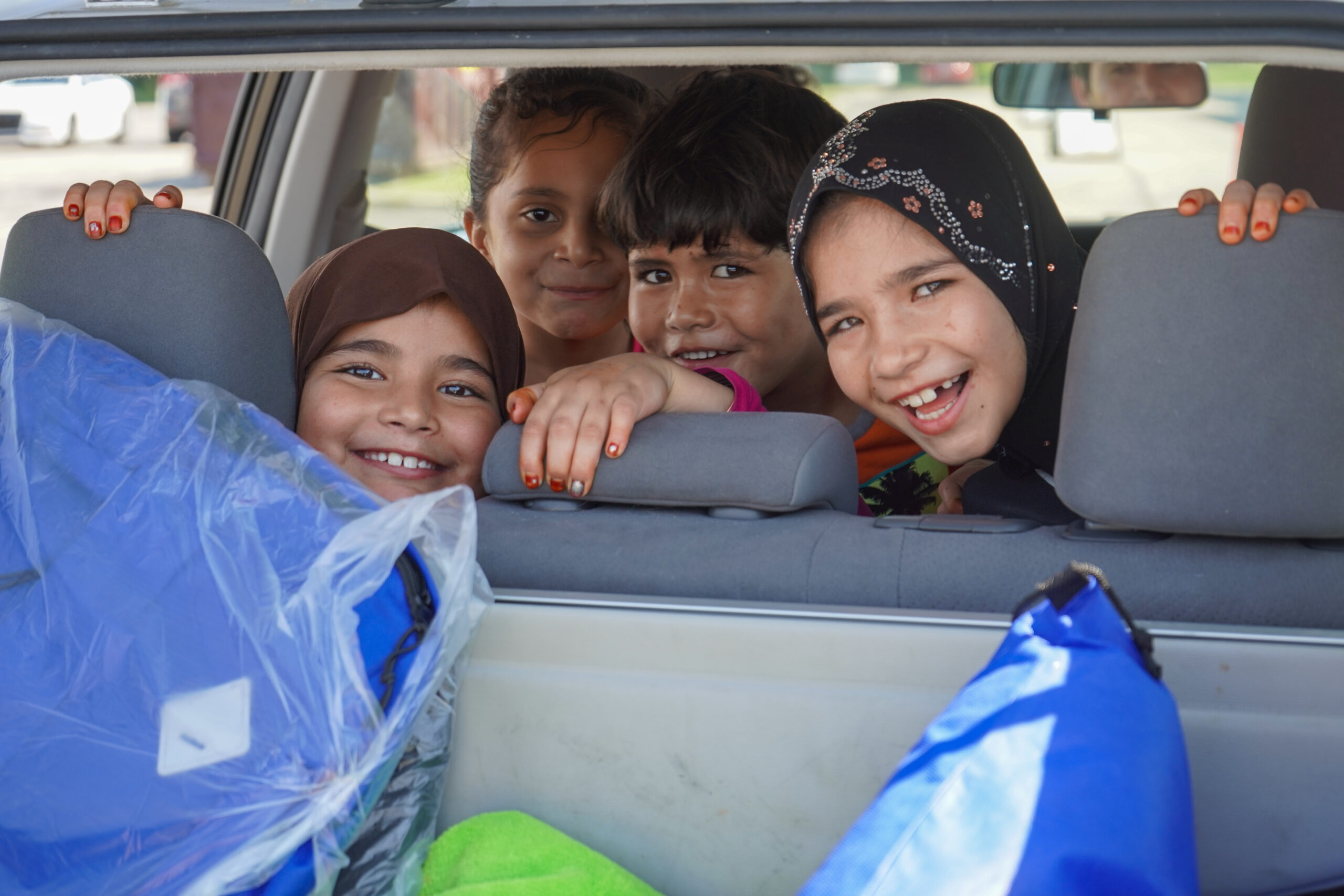
Photo by Kamal Shkoukani, courtesy of Hanan Refugee Relief Group
Children smile as Hanan Refugee Relief Group volunteers put bags of books, backpacks, school supplies and more in the trunk of their car at HRRG’s drive-through event for Afghan refugees in mid-September.
Zagloul had spent much of her spare time the previous semester researching the legalities of starting a nonprofit and was in the process of applying to establish it when she went to Lebanon.
“I knew being established as a nonprofit organization was important. It gives Books for Chance legitimacy, which means we can help more people,” she said, adding, “but I’m not going to lie, it was one of the hardest parts of this whole project. All the paperwork was overwhelming.”
She thought of a name for her nonprofit, “Books for Chance.” Then she enlisted her cousin, a graphic designer in Egypt, to develop a logo.
The idea behind the name is that books are “a way for children living in refugee camps to have a chance to reach their goals,” Zagloul said. “My cousin was able to design a super cute logo that pertained to the message and mission of Books for Chance.” She ordered the stickers in bulk.
Zagloul spread the word about her project through social media to family and friends. Soon books started coming in.
After personally delivering the first batch, she asked family friends to carry suitcases full of books when they traveled to Lebanon. Eventually, Bourj El Shamale ran out of room for more books and Zagloul started looking for other destinations where she could provide books to refugees.
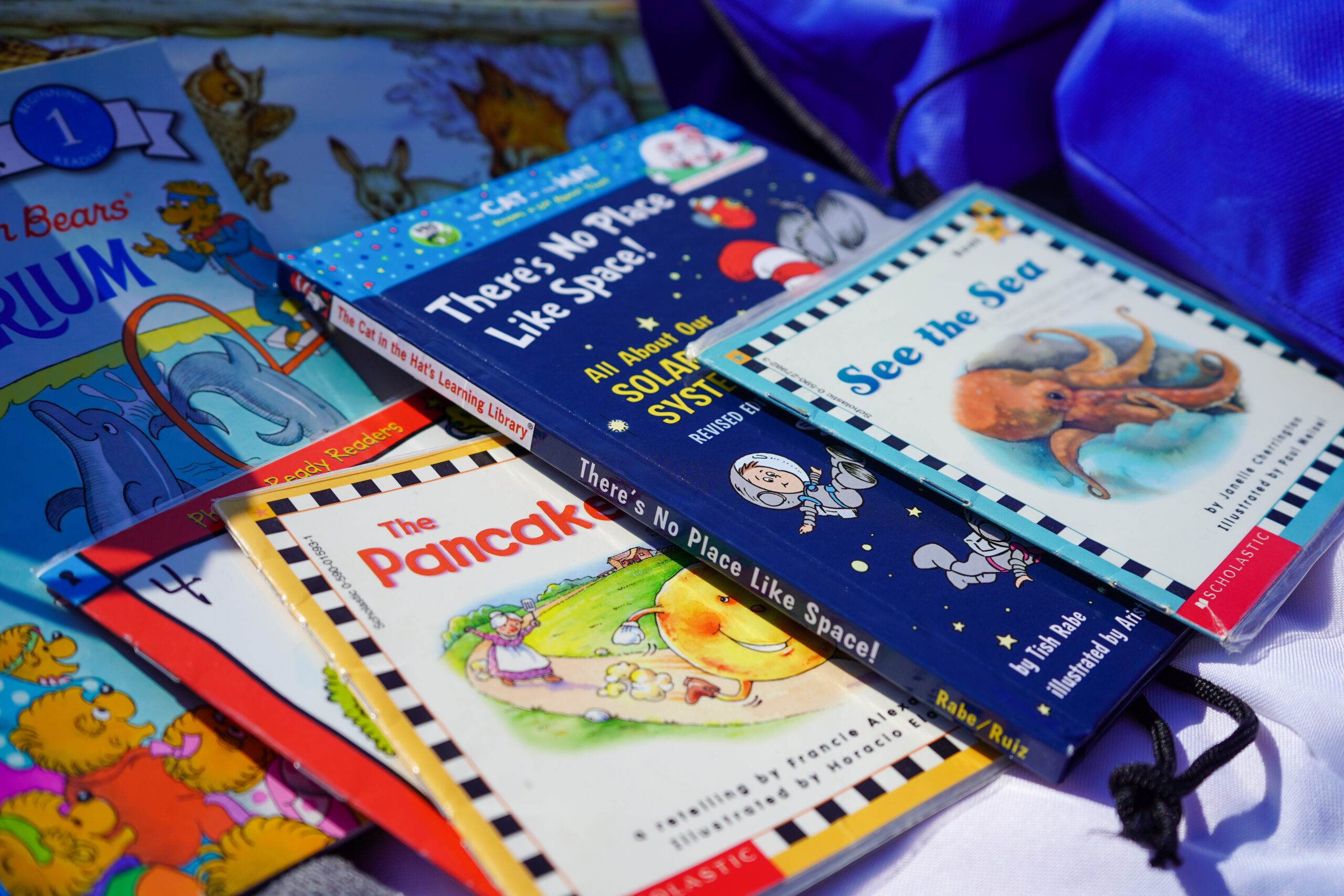
Photo by Kamal Shkoukani, courtesy of Hanan Refugee Relief Group
Children’s books from Books for Chance are displayed on a table with bags, school supplies and other items from Islamic Relief at Hanan Refugee Relief Group’s drive-through event in mid-September.
Throughout the rest of her undergraduate studies, while preparing for the medical school entrance exam (MCAT) and now in medical school, Zagloul has continued working on her Books for Chance projects. She holds book drives at the Medical College of Wisconsin and at mosques. She also responds to emails from would-be book donors, letting them know where they can drop books off.
Once she has donated books in hand, she goes through the books to make sure they are in good condition and are culturally appropriate, she said. When she is sure she “would be proud to give this book to a refugee,” she puts a “Books for Chance” sticker on it.
“I usually have my (medical school) lectures playing on my computer while I go through a box of books,” she said.
Responding to Syrian children affected by war
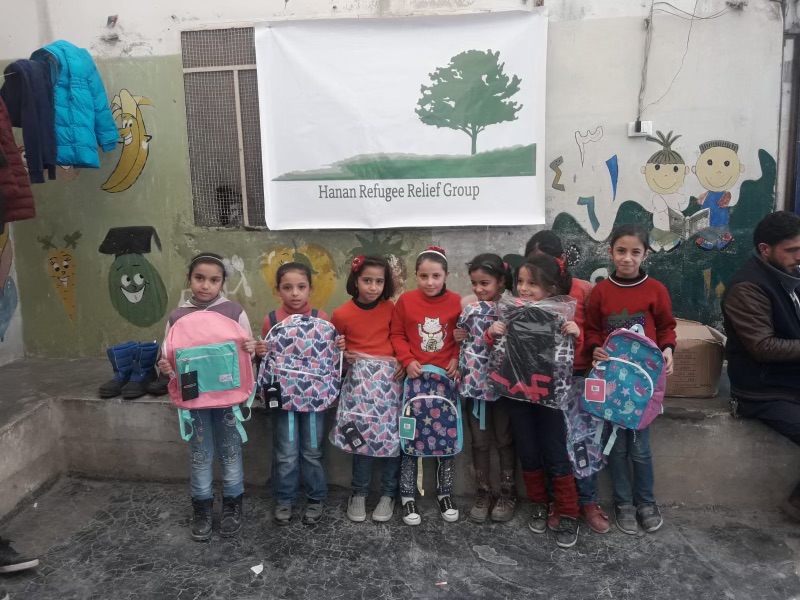

Photos courtesy of Hanan Refugee Relief Group
Books for Chance worked with Hanan Refugee Relief Group to provide children’s books to war-torn Syria.
In 2019, Zagloul heard from Dr. Ahmad Nasef, a supporter of HRRG, that the relief organization had the connections necessary to make shipments of books into war-torn Syria. By then, she had collected about 1,000 books that were sitting in a storage unit she rented.
“Working with Hanan was wonderful,” she said. “The books were put on a train to New York, a ship that crossed the Atlantic to Turkey and then on a truck drove them into Syria. I heard that they had arrived about a month later.”
Sheila Badwan, the Milwaukee lead for HRRG, explained, “A Syrian refugee who has resettled in Sheboygan coordinated the whole thing. Salvatorian Mission Warehouse in New Holstein shipped the container for us in 2020. Not only did we send the books, but medical supplies, backpacks for children and other items. The books and other supplies were distributed to children in schools in Al Daana and Sarmada, Syria.”
Helping refugees in Wisconsin
A wide array of refugees have resettled in Wisconsin. According to the Wisconsin Department of Children and Family Services, Wisconsin’s refugees include large populations of Hmong, Burmese (Rohingya and Karen), Somali, Bosnian and Iraqi. In addition, there is the recent resettlement of Afghans who fled after the August 2021 fall of their country to Taliban rule.
Hanan hosted a Day of Dignity Back to School Fair for all refugees at the end of August, in collaboration with Islamic Relief and local organizations, including the Milwaukee Muslim Women’s Coalition, Hayat Pharmacy, Islamic Society of Milwaukee, ISM-Brookfield, Our Peaceful Home, Layton Family Dental, Masjid Al Taqwa, Hunger Task Force and Muslim Community and Health Center (MCHC).. At the event, they distributed free school items, including backpacks, school and winterization kits, hygiene and first aid kids and more.
After the event, “we had a ton of supplies left over,” Badwan said. She connected with Zagloul to distribute Books for Chance books, along with other items, at a drive-through event for Afghan refugees in mid-September at Salam School on the south side of Milwaukee.
Meanwhile, the International Institute of Wisconsin reached out to Zagloul about distributing books at an event for the Rohingya community being held the same day.
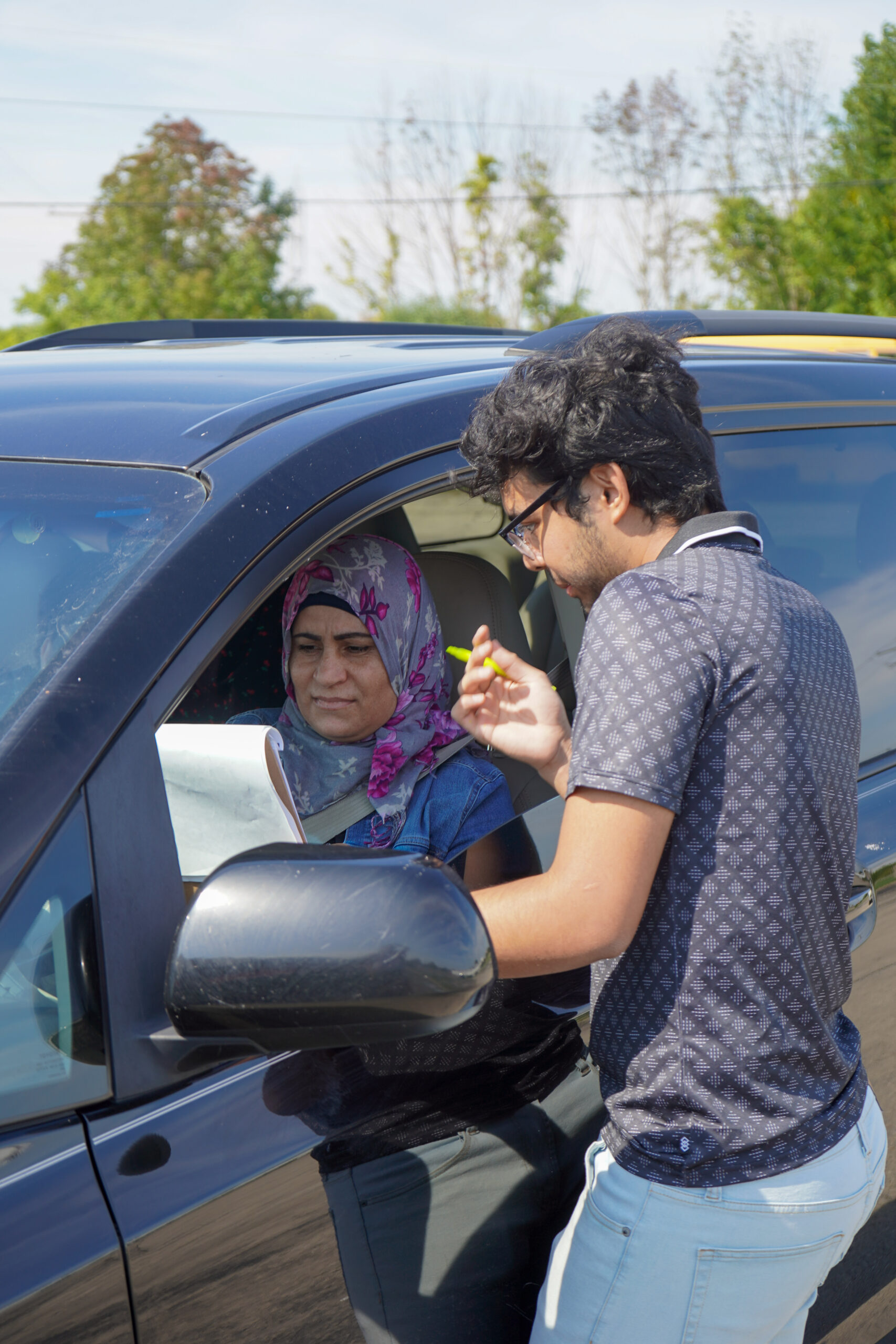
Photo by Kamal Shkoukani, courtesy of Hanan Refugee Relief Group
“These books can help the children and their parents, who are also learning English,” Badwan said. “The parents can pick up the books and read them, too.”
“Books empower people of all ages to develop dynamic reading and English skills while encouraging the use of our imagination and receiving knowledge. Maie’s nonprofit, Books for Chance, aims to do just that,” The Institute’s Community Engagement Coordinator Lilli Kenfield wrote in an email to WMJ.
“The International Institute of Wisconsin collaborates with Maie because she understands the value of providing books to refugees to expose them to unique experiences and foster understanding. Maie’s passion and The Institute’s mission complement one another.”
Zagloul held a book drive at the Medical College of Wisconsin in early September to prepare for the events. She sent out social media posts that were widely shared and the book drive captured media attention.
“Once the Milwaukee Journal Sentinel and Spectrum covered it, people from all over Milwaukee were calling to say, ‘I have books. How can I get them to you?’ It was incredibly heartwarming to see how many people were willing to help out.”
The book drive at MCW ultimately brought in more than 3,000 books, Zagloul said. But the books arrived over time: 1,000 in time for two events, which Zagloul divided evenly between them. Another 2,000 have been donated since.
“And they keep coming in!” she said.
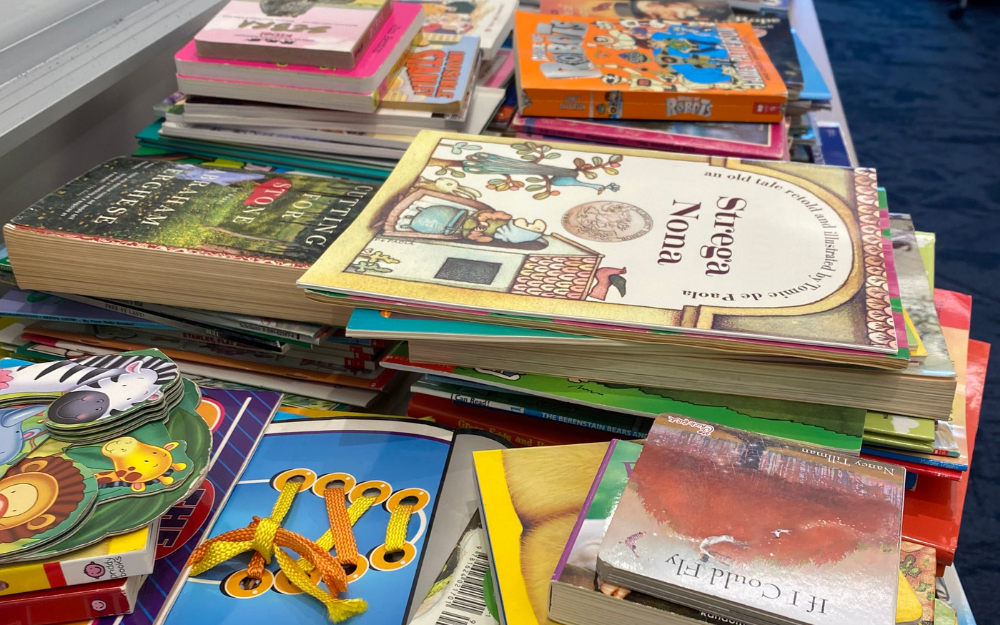
Photo by Kamal Shkoukani, courtesy of Hanan Refugee Relief Group
Publicity for the Books for Chance Book Drive at the Medical College of Wisconsin resulted in donations of 3,000 books.
Books in-waiting
And where are the remaining 2,000 books?
“Taking over my parents’ kitchen,” Zagloul laughed, just in time for Books for Chance’s first book fair.
Zagloul plans to be at the Book Fair next week. “I want to see the kids and be able to help them pick out books,” she said. “With the other projects we’ve done, the children didn’t get to choose the books. We hope they like the ones we chose for them, but I’m excited that at the book fair, they can choose something they want.
“To create that experience for refugee kids to walk around and browse the books, then pick some they want to read for free, that’s my dream,” she said.
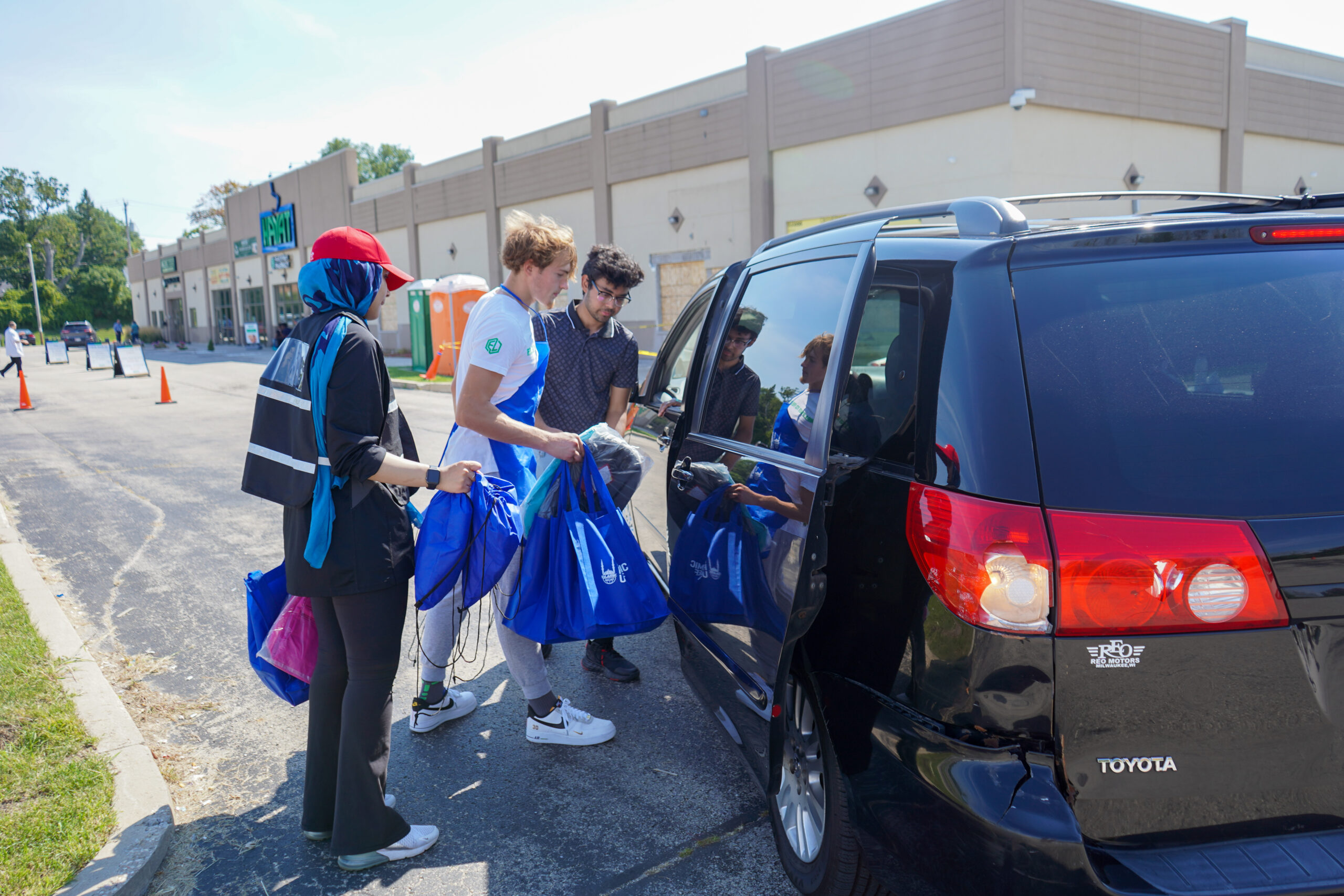
Photo by Kamal Shkoukani, courtesy of Hanan Refugee Relief Group
Volunteers at Hanan Refugee Relief Group’s drive-through event load a car with blue Islamic Relief bags filled with age-appropriate books for children of Afghan refugee families.
In addition to book fairs, Zagloul and her collaborators have more ideas.
“I have mentioned to her I would like to have a little library here (at HRRG’s office) for women who attend our ESL (English as a Second Language) program,” Badwan said. “And we now have one for men as well. It would be so nice if they were actually able to pick a book and take it home with them.”
Zagloul expects Books for Chance will be a lifelong project. “I’m incredibly passionate about it and there are always going to be refugees, wherever I go.”
She has done some soul-searching about her project. “When you go to a refugee camp and see six or seven people living in one room, I think, well what are these books doing? They are not improving their housing conditions or providing food.
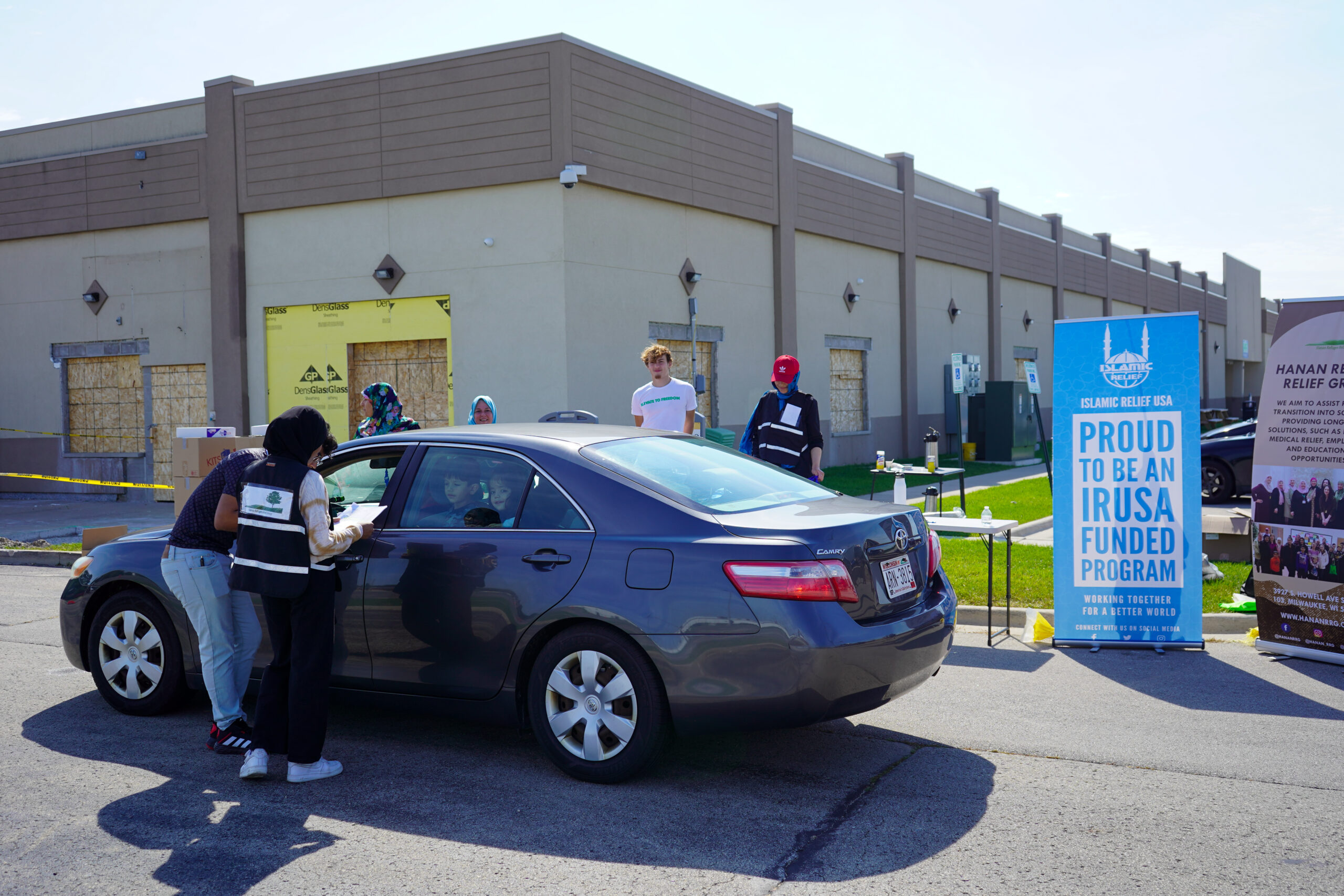
Photo by Kamal Shkoukani, courtesy of Hanan Refugee Relief Group
“But when refugee children talk about their hopes and dreams—to be an engineer or a movie star—and you look at their limited resources, when you think long-term, education is the only way out. I’m gathering books to give these kids a chance.
“And it’s not just me. Everyone who wants to donate, everyone who is so enthusiastic, is a reflection of the kindhearted individuals who feel compassionate about helping refugees. I hope the refugees can feel it.”
